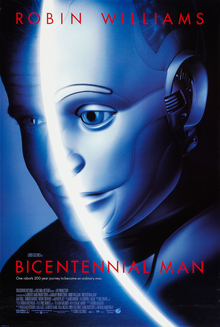Matching Mixed Media: What "The Picture of Dorian Gray" and "Bicentennial Man" Teach Us About Choice and Permanence
(Specifically in the Age of GenAI)

There are two things that I generally hold to be valid and true.
1) Stories only mean something if they have an ending.
2) Stories hold a continual power in society because of their ability to transcend time.
I’m not sure if these are inherently at odds with one another. It feels like the ephemeral nature of the former somewhat contradicts the persistence of the later. But perhaps, it’s less a competition between fleeting and enduring, and more an acknowledge that in order to be told, it has to done. A story without some sort of a resolution is not a particularly interesting story (at least not always).
Unsurprising to anyone who was talked to me over the last half decade, but I have unfortunately enter my “Villain Era” where after several years of being comically pro-robot, I find myself fervently critical of Generative AI, with Large Language Models currently bearing the bulk of my umbrage but I hate the field wholesale.
Another aspect of media that tech bros refuse to understand is that ideation and intention mean absolutely nothing unless you make actual decisions and execute on them. The purpose of creation is the process, not the final product. The purpose of this is the experience of doing it. Of making mistakes and learning from it and doing it again and again, and yes, it is hard, and yes, it’s not always pleasant, but that’s the goddamn point. Robots was always supposed to automate the things that humans were inherently bad at like numbers and routing and automating things so we could do others, and now LLMs are being purported to be the precursor to actual generalized intelligence when the entire foundation of the technology will forever hamper them to be bad middle management at best, to say nothing of the ecological and social issues that are arising because of this.
And while I could probably go on about this for several more days and will continue to be mad about all of this, the last Tuesday of the month is for Matching Mixed Media, so let’s pivot by comparing the vanity of tech bros to the vanity we see in…
The Picture of Dorian Gray
I do not think I have actually read the original story from Oscar Wilde where the character originated from. I think I know of the story due to cultural osmosis and the 2003 film The League of Extraordinary Gentlemen, which is by no means a good film, but it is an entertaining one.

The premise of Dorian Grey is a simple one. Not wanting to be subject to the passing of time, Dorian wishes that a painting of him would age in his place.
And for a while, Dorian reaps the benefits of eternal youth and functional immortality, as his portrait withers and rots to the eventual point of perversion where the only way the artist who was commissioned is able to recognize it is by his signature.
It feels apt don’t it? The rich and powerful wanting the prestige of art, while completely willing to corrupt it. The artist subject to their work distorted beyond recognition, only catching glimpses of their handiwork.
It’s hard not to see tech bros attempting to use this tech as a way to achieve immortality. To leave an indelible mark on the scale and say, look. LOOK.
The GenAI bubble is the latest of a technological hype cycle striving for an infinite growth that does not exist, and its wake, people will die. The world will turn and we will reckon with the consequences of forgoing making choices in favor of impulse and whim and power, not because humanity is inherently selfish, but because the current system is more than capable of making us selfish with sufficient incentive. But we are better than that.
I’d like to think we’re better than that. There are a bunch of corporations that are ramming this technology into every facet of our lives under the false pretense that it will make things better, when it reality it has mostly just made everything worse for everyone regardless of their involvement or participation in the machine.
So, we’re gonna jump from 1890 to 1999 and discuss…
Bicentennial Man

Spoilers for a movie that came out 26 years ago, I suppose.
I watched the Bicentennial Man very early on in my youth and it was one of many pieces of media that instilled a love of robotics (alongside The Iron Giant) and one that has continued to stick with me for the longest time, in no small part to Robin Williams’ performance.
In many ways, Bicentennial Man is the narrative reverse of Dorian Gray. Andrew is a functionally immortal cyborg who eventually stumbles into creativity and spends the better part of 200 years learning about humanity, eventually realizing that his functional immortality will forever distance himself from his loved one and instead opts to bring himself down to those of mortals, replacing the parts of himself with things that will fade, decay.
The movie ends with his death at 200, hence the title.
(Apparently, this movie was not particularly well received by critics, but that’s neither here nor there at this point).
The beauty of Bicentennial Man is the idea that things have to end. That living forever is not as fun as it sounds. That things still have meaning even after they are over. But it had to be over to fully appreciate that meaning.
Perhaps at some point in the future, I will revisit the idea of science fiction stories being an allegory for the magnum opus. Of wanting to make something, discover something so entirely novel that it rings true forever. Although, the magnum opus of a creative tends to have less far reaching ethical implications than the creation of life or the siphoning of an entire planet’s natural resources, at least typically.
But I get it to a point y’know. The want to make something that lives beyond you. But I don’t get wanting to live beyond the world.
Permanence
GenerativeAI is a means in which a fleeting fancy can manifest in a moment, at a great cost society has not really reckoned with it. It is pumped into the world and lingers, faint echoes of everything that came before it that took time and effort and choice.
Incidentally, I read an article about someone who outsourced their social life to ChatGPT for a week. And I don’t understand why you would want to automate being human. I don’t understand why you’d outsources your decisions to a statistical likelihood of a fancy autocomplete. We are not promised infinity, nor are we entitled to it.
We should be the one choosing how to live.